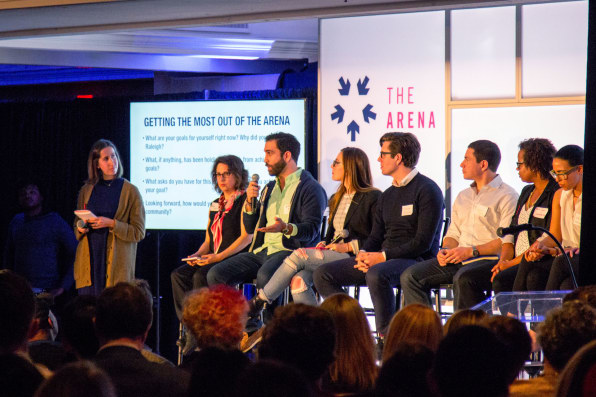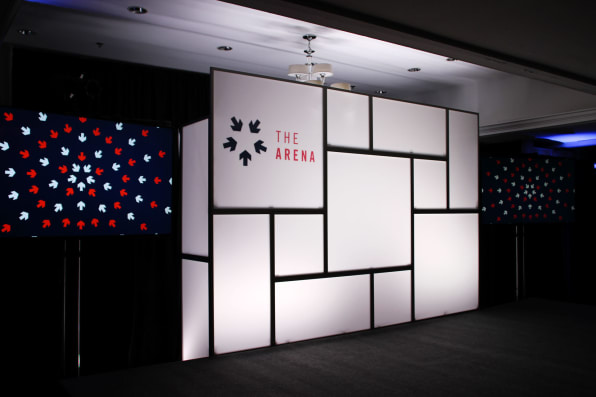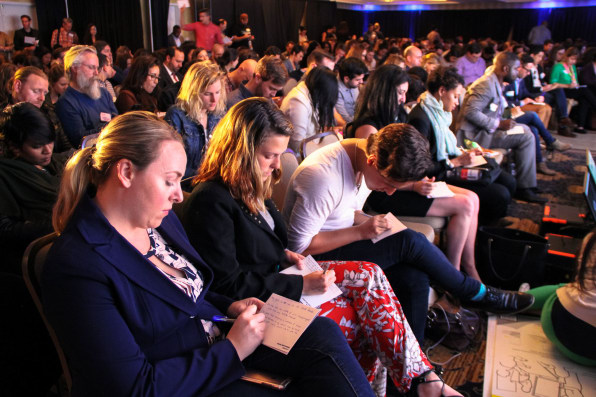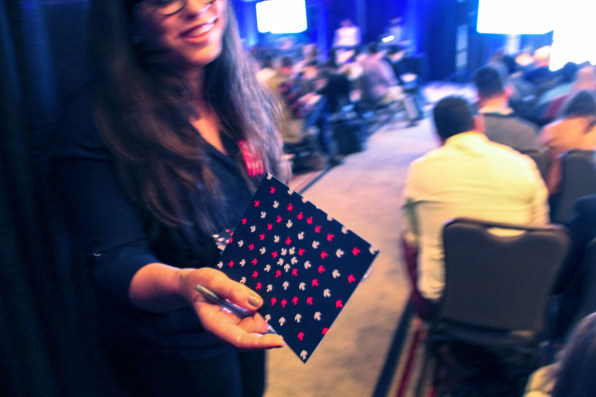It’s a Friday night in late March in Raleigh, North Carolina, and everyone at this hip two-story bar has spent the afternoon talking about politics. At one end of the bar sits a 29-year-old man with a broad chest, a thick dark beard, dressed casually in a hooded zip-up sweater and jeans, with a long pour of whiskey in hand. People in the room are seeking him out. They ask him his plans. Some people offer advice, others want to fund his not-yet-launched campaign. He greets the attention with the relaxed air of someone who is good at making small talk peppered with the occasional college basketball reference.
His name is Wisam Naoum and, like many others around the country, he had a crisis of conscience after the presidential election. “I grew up as the resident ethnic kid,” he told a packed room at a nearby hotel earlier in the day. He was the one with the weird ethnic food at lunch, he joked. The son of Chaldean Catholic Assyrian immigrants, Wisam’s parents fled Northern Iraq in the early ’80s and eventually landed in Detroit to start a new life. His family, living in a suburb outside the city, kept their culture alive and vibrant in the house, but “I was the only dark kid on my block,” he said, with the cool, deep cadence of a nice guy on a college Frisbee team. “I had to learn how to balance the culture at home with the culture at school.”

The kids on the bus knew him as “Peter”—his American name—because the bus driver couldn’t be bothered to pronounce Wisam. In time, he tells me later, he learned how to blend the two worlds into one. As a young adult he worked with a group of fellow immigrants that advocated for state and national resolutions to recognize the Assyrian conflict. He describes it to me as his first taste of politics. He majored in political science as an undergrad at Wayne State University in Detroit and went on to law school at the University of Michigan. He landed a high-paying job in Chicago as a corporate lawyer. That was three years ago.
Donald Trump’s win moved him to act, he tells me. “After the election I kind of was stuck, because I knew I wanted to do something, but I wasn’t sure what that was,” he says. Now the plan is beginning to take shape.
At the end of his speech earlier in the day he announced: “I’m leaving my job, I’m moving home, and I’m stepping into the arena.”
The Arena—that’s why we’re here. It’s a metaphor, a mind-set, and in practice, a recurring conference organized to cultivate Democratic talent for upcoming elections. Since even before the election, there has been a concerted effort to cultivate a new grassroots movement. A reclamation of what it means to be progressive. This has long been an issue boiling just below the surface of the mainstream Democratic machine, but there wasn’t enough collective momentum to do anything about it.
Related Video: Can Young Political Outsiders Save The Democratic Party?
Now, many believe, things are different. We’re in the Trumpression, and swift action is needed. Here, in Raleigh, is one attempt to make tangible change happen. The Arena is an organization that hosts summits to source new talent to run for office in red or swing states. It uses nomenclature from the tech startup playbook to illustrate how it stands apart (“We are the sherpas for these new civic entrepreneurs,” announces The Arena website). It’s even launched an “accelerator” to help fund candidates and organizations.
There are other, similar organizations, like Emily’s List, which was established in 1985 to focus on finding and electing more pro-choice women politicians. And Flippable, launched last year, uses technology to find the local races with the greatest chance of flipping blue and then dumps resources into those fights. There’s also Women’s March, Indivisible, the list goes on. These groups aren’t vying for institutional dominance per se—and they all work together and attend each other’s functions.

Hillary Clinton has even entered the grassroots-building fray with a new organization called “Onward Together.” It will encourage “people to get involved, organize, and even run for office,” she announced in a tweet.
These individual groups are all trying to define a movement that has yet to fully steep. The Tea Party gained dominance by going local and tailoring its message to the everyday American. Members went to town hall meetings, provoked engagement, and then ran for local office. And they won. Now it’s the Democrats’ turn.
Bernie Sanders excelled at making disparate, and often disillusioned individuals want to act, with income inequality being the common denominator. The Democrats are now trying to bottle up that energy and rebrand it. The challenge for The Arena—and other organizations like it—is in creating a community that speaks for something larger than its own election-winning ends.
Michael Bloomberg recently told Frank Bruni that Trump has a 55% chance of being reelected. Why? Because the Democrats never coalesced around messaging. “They’ll step on each other,” he told the columnist. Even Hillary Clinton has admitted that the party is in disarray. “I inherited nothing from the party. It was bankrupt,” she said at Recode’s Code Conference.
Everybody wants to be part of a new progressive movement, but it’s not clear what it is, how it will work, or for whom it speaks.
I see this at a local meetup in New York City, which I attended a month before the Raleigh conference. The event, hosted by members of The Arena’s digital platform, is a microcosm of the national Arena organization. The attendees, mostly in their mid-twenties to thirties, sipped wine, milled about the large one-bedroom apartment, and talked about the work they’re doing to reinvigorate the Democratic Party and bring about a more localized effect—something that many people told me they found missing from the party over the last few years.
Some of them are hosting affinity groups for certain political causes, such as reproductive rights. Others are raising funds for local races, or simply felt the need to join active political groups. One man in the room recounts how his family forced him to attend gay conversion therapy for years, and he’s now mulling a run for political office with the ideological platform that no child should endure what he did. And one woman has set up what she says is the largest meditation meetup at the top of the World Trade Center (the political outcomes of this one were unclear). Many of the attendees hail from the technology sector, and quite a few of the attendees go on to attend the summit in North Carolina.
Naoum attended the first Arena conference last December in Nashville, along with about 400 others. But he wasn’t really sure why. Some friends had told him about it, and he was intrigued by the promise of a way to learn how to build a new progressive resistance in the Trump era. He went on a whim. At the time he had no notions of running for public office. But something about the spirit of the event and the idea of becoming more politically engaged clicked. After leaving Nashville he couldn’t shake the idea of entering politics.

Nearly 700 people are at the second summit. There are a slew of speakers, including established Democratic players like Jennifer Granholm, former North Carolina governor Bev Perdue, and former Virginia congressman Tom Perriello. It’s part pep rally, part indoctrination into the Democratic operating system.
“If you’re in a red state, I need you right now,” proclaims Michigan state senator Ian Conyers to the Raleigh crowd on the first day. Conyers, a dapper, mustachioed 28-year-old with a gelled side part, has already done what The Arena is encouraging its attendees to do. He went to Georgetown and did some political work in Washington, D.C., before moving back to Detroit to run for the state senate. He is now the youngest person to ever hold that office, and sees his example as a way to show people that the path is possible. And, as I follow Naoum for the rest of the weekend, I notice Conyers’ keen interest in the young Assyrian.
Naoum’s not at The Arena for the motivational speeches, though. He’s here to gain real tools for running a campaign and meeting with the right people who may be able to help him win. At a “crafting your message” session, dozens of attendees funnel into a small area where four personal branding experts explain how to weave a narrative: Don’t list accomplishments like a resume, be authentic; always tells a story. A candidate for the governor of Michigan, Abdul El-Sayed, takes the stage and tells his tale. He talks about growing up Muslim in the Detroit suburbs. The 32-year-old worked his way up from physician to city health commissioner, and now he’s running for the highest state office. His strategy is to take his personal struggles as a person of color and make it into an uplifting narrative that everyone can relate to. “No way to be anybody but who you are,” El-Sayed says. Naoum scribbles notes.
Another session Naoum attends focuses on “traditional fundraising,” and it illustrated a much more fraught political reality. The room is significantly less packed than the message-crafting one. It goes through the nuts and bolts of figuring out who to call and how to get people to donate to your candidacy. More than a few people leave mid-session. Here is the less inspirational side of politics writ large.
The conversation ultimately leads to big donors, namely Super PACs. Some people in the audience feel uncomfortable with taking such money—especially on the heels of Hillary Clinton’s failed presidential bid. The panelists disagree—”you’re not making any promises,” says one panelist. “I’d sooner say don’t take individual money,” says another.
This doesn’t sit well with Naoum, who campaigned for Bernie Sanders. “It’s pissing me off,” he says. Super PACs are a “system for the wealthy. I should know—I worked with the wealthy.” Later, he tells me he sees his political message as standing for the oppressed. “I’ve always been anti-establishment,” he says. He first became politically engaged going to Ralph Nader talks, which he didn’t necessarily take seriously yet felt a real affinity toward. Sanders, however, sealed the deal for him. “What Sanders showed is that millennials our age, we do care, we do want to get involved,” he tells me. So, after working as a corporate lawyer, and nearly joining the one percent, he changed his mind about what he wanted to do with his life: He believes in the political process and does not want to accept corporate money.
Herein lies the rub: Naoum is probably going to need the DNC’s fundraising machine in order to succeed, but the DNC is going to have to change in order to continue attracting people like him into their ranks.
A few weeks after the Arena, Naoum is elected to the finance committee of Michigan’s Democratic Party. He’s also helping organize the next Arena summit in Detroit in early June. As a synecdoche for the Arena and a dozen other progressive organizations, he’s perfect—both disillusioned and hopeful about what’s next. He has a deep-seated need to do something big, but the road ahead is murky.

Lucky for him, he’s got a community and knows the people there. He is returning to the place where he grew up because he feels a need to reclaim it. Where progressives are scrambling to make a cohesive and electable movement that speaks for an entire disenfranchised people—many of whom are not ideologically aligned—smaller players with skin in the game are starting to make real progress. The Democrats need Naoum, just as much as he will need their support down the line.
These uncertainties hover in the smoke above my last conversation with Naoum at the summit. We were sitting outside another hip bar and discussing the future between puffs from a cigar. He talks about the time his law firm became giddy at the prospect of facilitating layoffs for a client in the name of saving a few bucks, and how his culture led him to seek out a more politically active life. He’s received the weekend’s wisdom and is ready to go forth.
“Are you ready?” his friend asks.
He responds, cigar in mouth, “for whatever comes next… yeah, I am.”
Moving back home to run for office has never been so important, or fraught.
It’s a Friday night in late March in Raleigh, North Carolina, and everyone at this hip two-story bar has spent the afternoon talking about politics. At one end of the bar sits a 29-year-old man with a broad chest, a thick dark beard, dressed casually in a hooded zip-up sweater and jeans, with a long pour of whiskey in hand. People in the room are seeking him out. They ask him his plans. Some people offer advice, others want to fund his not-yet-launched campaign. He greets the attention with the relaxed air of someone who is good at making small talk peppered with the occasional college basketball reference.
Fast Company , Read Full Story
(60)